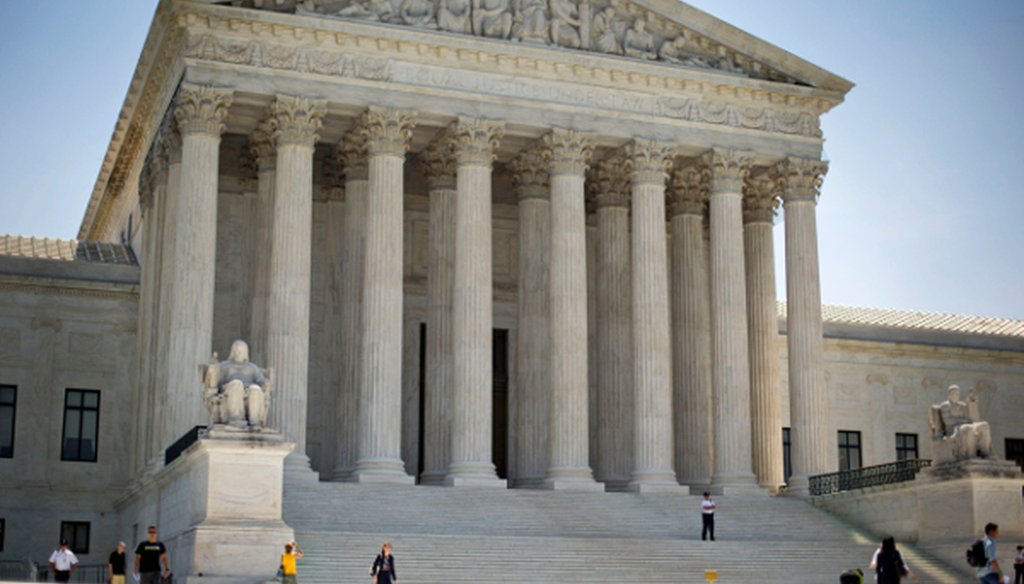Stand up for the facts!
Our only agenda is to publish the truth so you can be an informed participant in democracy.
We need your help.
I would like to contribute

The Supreme Court in Washington D.C. on June 30, 2014.
First birth control, next blood transfusions?
That’s an argument many progressives and abortion-rights groups are making in the wake of the Supreme Court decision in Burwell vs. Hobby Lobby.
In a narrow 5-4 decision Monday, the high court said that closely held corporations with strong religious convictions don’t have to offer insurance that covers four kinds of contraceptives mandated by the Affordable Care Act. While the opinion, written by Justice Samuel Alito, was narrowly tailored to only apply to the cases before the court, others warned of a slippery slope.
"Today it's birth control," said NARAL Pro-Choice America president Ilyse Hogue in a statement. "Tomorrow it could be any personal medical decision, from starting a family to getting life-saving vaccinations or blood transfusions."
Indeed, even the justices bickered over the scope of the decision.
In her dissent, Justice Ruth Bader Ginsburg asks whether the ruling extends to employers "with religiously grounded objections to blood transfusions, antidepressants, medications derived from pigs including anesthesia, intravenous fluids and pills coated with gelatin, and vaccinations?"
In the majority opinion, Alito responds to that critique. "Our decision should not be understood to hold that an insurance-coverage mandate must necessarily fail if it conflicts with an employer’s religious belief." He adds, rather poignantly, that the administration provided "no evidence to substantiate this prediction" that overruling the birth control mandate could lead to similar challenges against blood transfusions or vaccines.
So is this a narrow ruling, as Alito hopes, or does it open the door to future successful challenges?
We spoke with a number of constitutional and insurance industry experts. The unsatisfying answer is a resounding: We don’t know.
"Sometimes the question of who was right must await subsequent decisions," said Stephen Wermiel, a constitutional law professor at American University. "Justice Alito may want the precedent to be limited to the insuring of contraceptives, but it is not at all clear why it would not apply to other claims like those raised in Justice Ginsburg’s dissent."
While some future challenges are likely, the historical evidence suggests there will be relatively few. And they face an uphill battle getting a court to apply Alito’s rationale to their complaint, experts said.
Let’s explain why.
History
In her dissent, Ginsburg wondered if Jehovah's Witnesses, who oppose blood transfusions on religious grounds, might similarly challenge the Affordable Care Act.
So far, "no business has made such a claim about any other medical treatment," said Douglas Laycock, a law professor at the University of Virginia.
While the court’s ruling doesn’t close the door on those challenges, if history is any indication, there won’t be many, said Robert Laszewski, president of the health consulting firm Health Policy and Strategy Associates.
Before the Affordable Care Act, employers were free to drop blood transfusions or any other medical procedures from policies they provided (as long as the state didn’t mandate coverage). In 40 years working in the employee benefit business, Laszewski said he has "never heard of an employer who ever did anything like not cover vaccines or blood transfusions."
Insurance companies, too, might be very hesitant to even allow a company to make those exemptions on a policy. Laszewski recalls in the 1990s, an employer wanted his health insurance to exclude AIDS coverage.
"We refused to do so," Laszewski said. "And, after I called the employer personally and explained our position, the employer agreed to cover it."
The uniqueness of Hobby Lobby
The majority’s case highlights the strong religious backgrounds of Hobby Lobby and the two other businesses that contested the birth control mandate.
For example, Alito notes that while Hobby Lobby is a for-profit corporation with more than 500 stores, it remains "closely held" by the Green family and their children, who have signed a pledge to run the business "in accordance with the family’s religious beliefs." They close on Sundays and support Christian ministries.
This is not common in businesses, especially among large companies of 50 or more employees that would fall under the health care law’s employer mandate, our experts said. It’s unusual to have corporate structures or mission statements committed to certain religious beliefs and an executive leadership that is unanimous in their faith.
In other words, "This is the perfect plaintiff," said Susan Bloch, a constitutional law professor at Georgetown University. "They really did run a religious company. It was an extension of the family’s religious concerns and beliefs."
Closely held corporations that challenge the law in the future may not be able to convince the court they, too, possess such clear religious convictions.
"It’s not too hard to see how the decision can be read literally" and only apply to Hobby Lobby, Bloch said. "But people will try to read it broadly and courts will grapple with that."
Alito’s fix
The court relies on the Religious Freedom Restoration Act to strike down the contraceptive mandate as it applies to this case.
This law, passed in 1993 under President Bill Clinton, says the government cannot burden a person’s ability to exercise religion unless there’s a compelling government interest and the burden is the "least restrictive means" for the government to accomplish its goal.
Alito says it’s pretty obvious this is not the least restrictive means for the government to get contraceptives to every woman without interfering with religious belief. Why? Because the Obama administration is already doing it.
The Department of Health and Human Services allows religious nonprofits to exempt themselves from the contraceptive requirement. In these cases, the insurance company still provides the employees with free birth control, but the employer does not pay for it.
Alito asks why this workaround couldn’t also be used by closely held private companies that object to the birth control mandate.
The fact that a workaround existed for birth control helped Hobby Lobby’s case. But there probably won’t be existing workarounds for other medical procedures.
"In future cases, if the government has not provided a similar exemption to other parties, it will be easier to convince the court there is good reason to deny the claimed exemption," said Kurt Lash, director of the Program on Constitutional Theory, History and Law at the University of Illinois.
The administration’s fix for religious groups that don’t want to cover birth control has one other very important element to it: It doesn’t cost anything extra to insurance companies or employees to provide contraceptive coverage. Insurance companies, the administration said, actually save money by providing birth control versus paying for pregnancies. That may not be the case for other procedures.
"It’s not clear to me that this would be so for blood transfusions and immunizations; and if it isn’t so, then the proposed alternative means might be too difficult to implement," said Eugene Volokh, a law professor at UCLA.
"Generally speaking," he added, "the harder your religious objection is to accommodate, the easier it is for the government to persuade courts that the government doesn’t need to accommodate it."
Our Sources
NARAL Pro-Choice America, "Statement: NARAL Pro-Choice America reaction to the Supreme Court decision on Hobby Lobby," June 30, 2014
Supreme Court, Secretary of Health and Human Services v. Hobby Lobby Stores, Inc., June 30, 2014
Email interview with Douglas Laycock, professor of law at the University of Virginia Law School, July 1, 2014
Email interview with Kurt Lash, Director of the Program on Constitutional Theory, History and Law at the University of Illinois College of Law, July 1, 2014
Email interview with Stephen Wermiel, law professor at the American University Washington College of Law, July 1, 2014
Email interview with Eugene Volokh, law professor at UCLA, July 1, 2014
Phone interview with Susan Bloch, constitutional law professor at Georgetown University, July 1, 2014
Email interview with Robert Laszewski, president of the health consulting firm Health Policy and Strategy Associates, July 1, 2014
JW.org, "Why Don’t Jehovah’s Witnesses Accept Blood Transfusions?" accessed July 1, 2014




















































